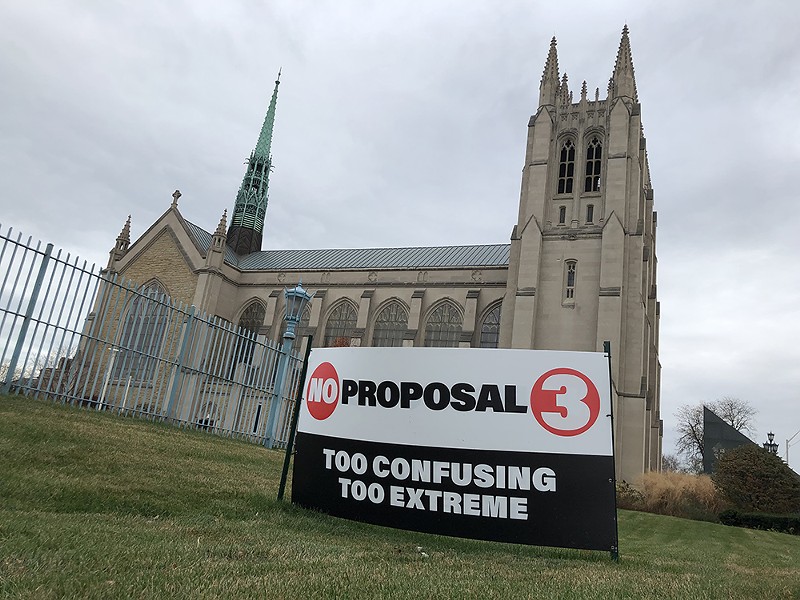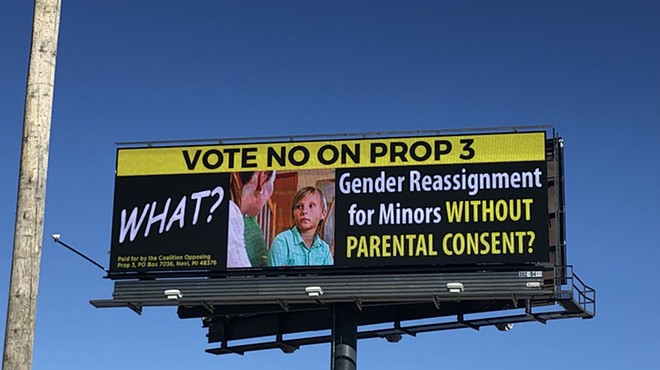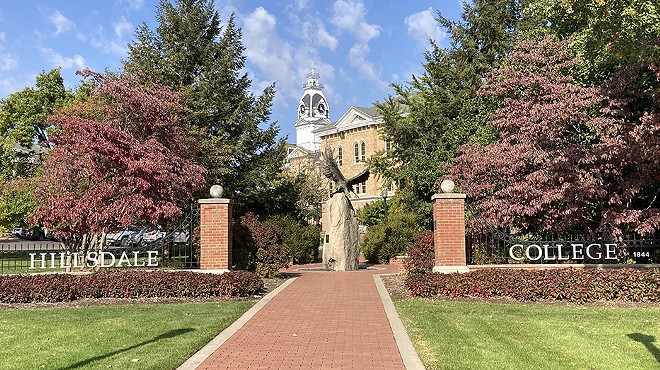
You’ve seen the law signs: Michigan’s Proposal 3 is “CONFUSING” and “EXTREME.” If you’re a Catholic, you’ve probably even seen such a sign inside church, and the parish priest has told you it’s your religious duty to vote against the pro-choice measure.
The Michigan Catholic Conference and Michigan Right to Life have formed “Citizens to Support Michigan Women and Children” (CSMWC) to wage a multimillion-dollar campaign to paint the proposal in an alarming way — not only as granting a women’s right to choose in all circumstances, but also as permitting a child to get gender-reassignment treatment without parental consent.
Anna Visser, communications coordinator for CSMWC, even insists that if Prop 3 passes, it would create a “super-right” which could never be challenged in court or constrained by a vote of the state legislature. And in a YouTube video widely referenced by the anti-3 group, a Michigan Catholic Conference policy advocate, Rebecca Mastee, claims: “This goes way beyond what Roe vs. Wade ever permitted.”
These and other claims by the “anti” group sound pretty scary. But they’re very suspect, say Prop 3 supporters, organized as Reproductive Freedom for All. RFFA has outspent CSMWC by a more than two-to-one margin, and it terms the ballot measure a “common-sense, middle-ground” approach” that uses very similar language to Roe “to restore the rights we’ve had for more than 50 years.”
Prop 3 doesn’t place restrictions on abortion by age of the woman, stage of the fetal development, or cause of pregnancy. If it passes, it would be one of the strongest pro-choice laws in any state, reversing an 1931 blanket ban on abortion in Michigan, which would have gone into effect when Roe’s protections were dismantled by this summer’s U.S. Supreme Court ruling. Challenged in an ongoing court case led by Gov. Gretchen Whitmer, the 1931 law is now temporarily in limbo.
Would Prop 3 allow minors to change genders on their own? An analysis by the Diocese of Lansing contends that the ballot proposal’s guarantee that “every individual has a right to reproductive freedom including … all matters relating to pregnancy, including … sterilization” would somehow allow children, as “individuals,” to have what the diocese terms “a constitutional right to sterilization” … without any parental involvement” since the “hormones and medications used in ‘gender transition’ treatment are the same used for some types of sterilization, while gender change procedures and surgeries are inherently sterilizing.”
Quite a stretch, say RFFA spokespeople.
Proposal 3 does not change any laws regarding parental involvement, says U-M constitutional law professor Leah Litman, who points out that the ballot language affirms the state can regulate post-viability abortions.
CSMWC’s Visser also claims that Prop 3 would create a permanent, unalterable “super-right,” and the group’s website says, “All laws enacted by the legislature must comply with the Constitution, or they are invalid. … the Courts will not uphold those laws if they are challenged.”
Washtenaw County Prosecutor Eli Savit says this and other anti-3 campaign claims are “filled with falsehoods.” The anti-3 claims are “all designed to distract and confuse voters,” says Darci McConnell of RFFA. “Those lies hide their real agenda” — a return to the 1931 ban, which has no exceptions for pregnancies resulting from rape or incest.
The RFFA’s main component groups, the state chapters of Planned Parenthood and the ACLU, have pledged, along with Whitmer, to seek a repeal of the state’s 1931 abortion ban if Prop 3 is defeated.
But the church, which is allowed under federal law to work on ballot proposals but not on candidate campaigns, is going all-out to defeat Prop 3. All seven of Michigan’s Catholic dioceses have been provided with lawn signs, Visser said, though she didn’t know how many.
In a letter posted on the Archdiocese of Detroit website, Archbishop Allen Vigneron says Prop 3 “would revoke the right to life for an untold number of human beings,” calling it “the most extreme proposal concerning abortion this state or country has ever seen,” and asserting that it “would transform Michigan into ground zero for abortions performed anywhere, at any time, by any person, for any reason.”
On Friday, more than a dozen religious leaders endorsed Proposal 3 including “Catholics for Choice” president Jamie L. Manson, saying “polls consistently show that a majority of U.S. Catholics believe abortion access should be legal in all or most cases.”
Michigan voters will decide on Proposal 3 on Tuesday.
Stay connected with Detroit Metro Times. Subscribe to our newsletters, and follow us on Google News, Apple News, Twitter, Facebook, Instagram, Reddit, or TikTok.



